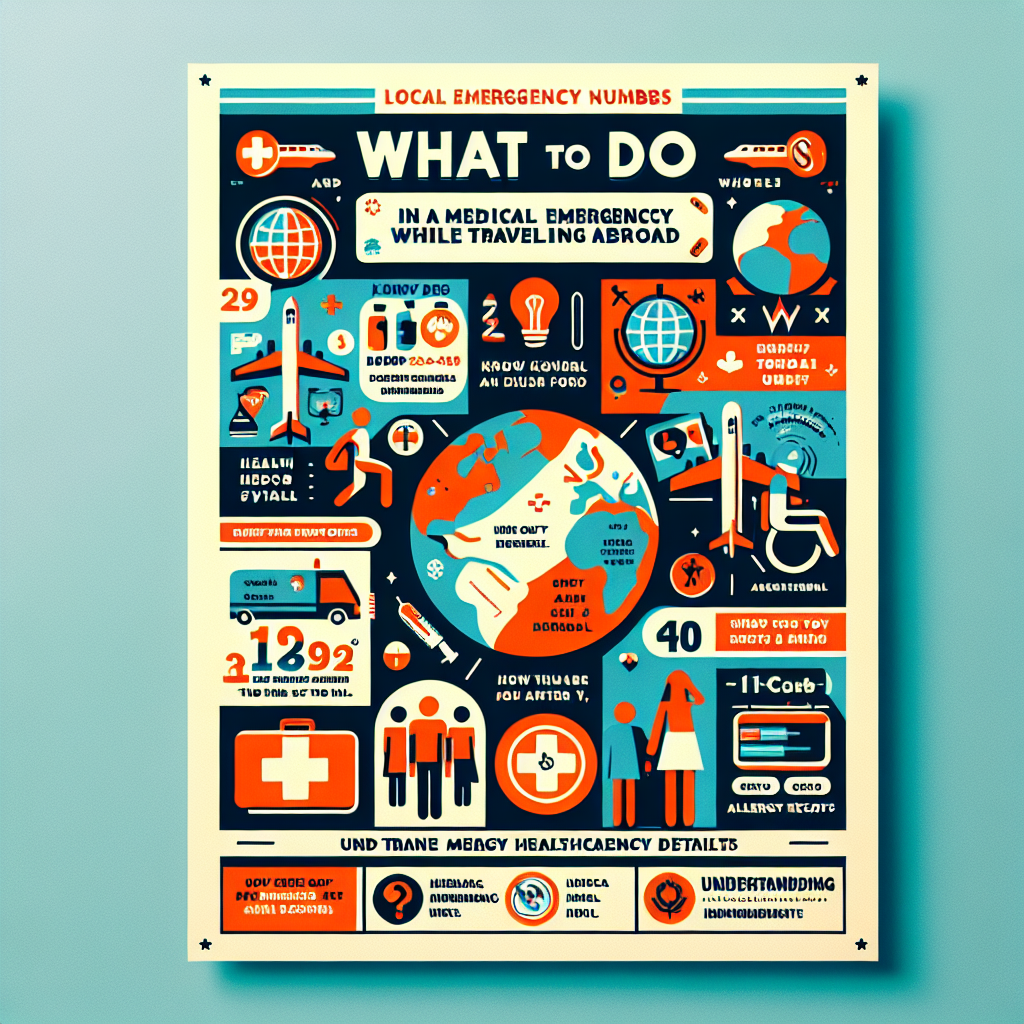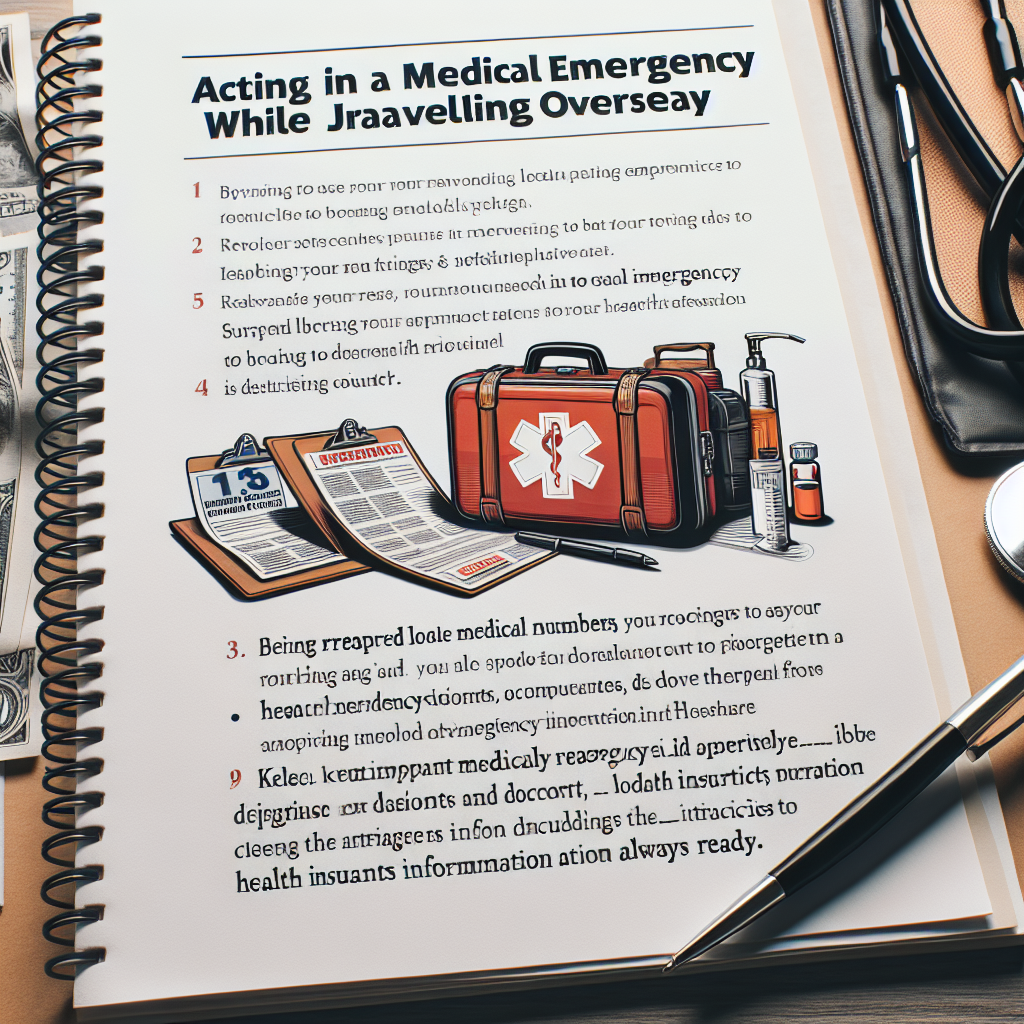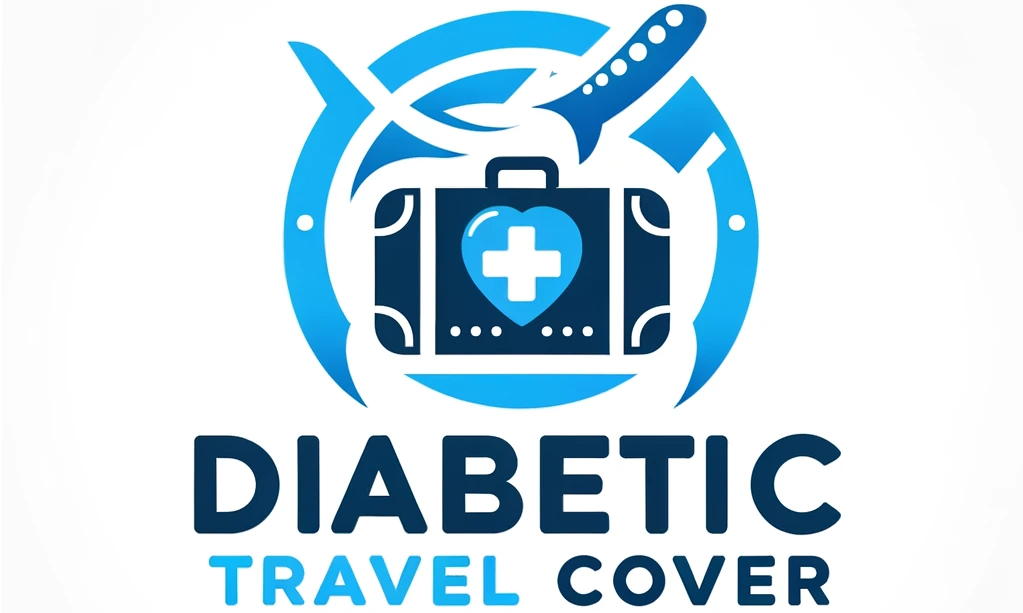Imagine this scenario: you’re traveling in a foreign country, marveling at the breathtaking sights and immersing yourself in a new culture. Suddenly, you find yourself facing a medical emergency. Panic sets in as you realize that you don’t know what steps to take. In this article, we will guide you through the essential actions to handle a medical emergency abroad. From contacting local emergency services to navigating language barriers, we’ve got you covered. Keep reading to ensure you’re well-prepared for any unexpected health issues during your travels.

Understanding the Risks of Traveling Abroad
Knowledge on common health risks in certain destinations
When traveling overseas, it is essential to have a good understanding of the potential health risks in the destinations you plan to visit. Different regions of the world present various health challenges, such as infectious diseases, food and waterborne illnesses, insect-borne diseases, and altitude sickness. Researching these risks beforehand will allow you to take necessary precautions and protect yourself from potential health issues.
Knowing the condition of local healthcare systems
Another crucial aspect of understanding the risks of traveling abroad is knowing the condition of the local healthcare systems in your chosen destination. It is important to be aware of the quality of medical services, availability of healthcare facilities, and access to necessary medications or treatments. This knowledge can help you make informed decisions and prepare for any potential medical emergencies that may arise during your trip.
Immunization and Vaccinations needed
Immunization and vaccinations are essential to protect yourself against certain diseases that may be prevalent in your travel destination. Before embarking on your journey, consult a healthcare provider or a travel medicine specialist to determine if there are any specific vaccines recommended or required for your intended location. Ensuring that you are up to date on routine vaccines and obtaining any additional recommended vaccinations is crucial for minimizing the risk of contracting preventable illnesses while traveling abroad.
The Importance of Travel Insurance
Benefits of having travel insurance
Having travel insurance is extremely important when traveling abroad, as it provides financial protection and peace of mind in case of unexpected emergencies. Travel insurance typically covers medical expenses, trip cancellations or interruptions, lost or stolen belongings, emergency medical evacuations, and personal liability. By having travel insurance, you can minimize the financial burden of unforeseen circumstances and focus on getting the necessary assistance you need.
What to look for when purchasing travel insurance
When purchasing travel insurance, there are several key factors to consider. Look for policies that provide adequate coverage for medical expenses, including emergency medical evacuation. Additionally, ensure that the policy covers any pre-existing medical conditions you may have. It is also important to review the policy’s exclusions and limitations to fully understand what is covered and what is not. Lastly, consider the reputation and reliability of the insurance provider, as well as the ease of filing claims and their customer support services.
How travel insurance handles medical emergencies abroad
In the event of a medical emergency abroad, travel insurance plays a crucial role in providing assistance and financial coverage. Depending on the severity of the situation, travel insurance can cover medical expenses, hospitalization, emergency medical evacuation, and repatriation. It is important to inform your travel insurance provider as soon as possible in case of a medical emergency to ensure a smooth claims process and receive necessary guidance and support throughout the ordeal.
Basic First Aid Knowledge and Skills
Importance of having basic first-aid skills
Having basic first-aid skills is essential for any traveler, as it enables you to provide immediate assistance and potentially save lives in emergency situations. Knowing how to perform cardiopulmonary resuscitation (CPR), control bleeding, treat minor wounds, and manage allergic reactions can make a significant difference while waiting for professional medical help to arrive. These skills not only empower you to provide aid to others but also enable you to take care of yourself in case of an injury or sudden illness.
First-aid skills to learn before traveling
Before traveling, it is advisable to learn and practice certain first-aid skills that are particularly useful in a travel setting. These skills may include assessing vital signs, administering basic life support techniques, immobilizing broken bones, treating burns, and managing common travel-related illnesses such as traveler’s diarrhea. Many organizations offer first-aid courses specifically tailored for travelers, so make sure to enroll in one to gain the necessary knowledge and confidence to handle medical emergencies while abroad.
Carrying a basic first-aid kit while traveling
Carrying a basic first-aid kit while traveling is crucial as it allows you to promptly respond to minor injuries or illnesses. The contents of a first-aid kit may vary depending on personal needs and travel destinations but should generally include items such as adhesive bandages, sterile gauze, antiseptic wipes, pain relievers, allergy medication, tweezers, and scissors. It is important to periodically check the expiration dates of medications and replace any items that have been used or are no longer effective. Additionally, familiarize yourself with the contents of the kit and their proper usage.
Identifying a Medical Emergency
Common medical emergencies while traveling
While traveling, it is essential to be able to identify common medical emergencies to know when immediate action is needed. Some common medical emergencies that travelers may encounter include severe allergic reactions, heart attacks, strokes, trauma, dehydration, respiratory distress, and food poisoning. Understanding the signs and symptoms of these emergencies can help you recognize when someone requires urgent medical attention.
Signs and symptoms to watch out for
Being aware of the signs and symptoms associated with various medical emergencies can assist you in identifying the severity of a situation. For instance, signs of a heart attack may include chest pain or discomfort, shortness of breath, nausea, and lightheadedness, while symptoms of a stroke may manifest as sudden numbness or weakness in the face, arm, or leg, confusion, difficulty speaking or understanding, and severe headache. It is crucial to pay attention to any changes in a person’s condition and take appropriate action based on the observed signs and symptoms.
How to respond to different types of medical emergencies
Responding appropriately to different types of medical emergencies can make a significant difference in the outcome for the affected individual. In case of a severe allergic reaction, administer an epinephrine auto-injector if available and seek immediate medical attention. During a heart attack, call local emergency services, assist with any prescribed medications, and provide comfort and reassurance until professional help arrives. In situations where immediate medical attention is required, such as in the case of a stroke or trauma, it is important to call emergency services while ensuring the safety and stability of the patient.

Immediate Response to Medical Emergencies
Steps to take after identifying a medical emergency
Once a medical emergency has been identified, it is crucial to act promptly and take appropriate steps to ensure the well-being of the affected individual. Start by calling emergency services or the local equivalent to request immediate medical assistance. While waiting for help to arrive, provide any necessary first aid or CPR, if trained to do so. It is important to reassure the person and remain calm, as this can help alleviate their anxiety and encourage them to cooperate during the emergency.
Importance of staying calm and collected
Staying calm and collected in a medical emergency is vital as it allows you to think clearly, make rational decisions, and effectively communicate with both the patient and the medical professionals who will be providing assistance. Panic and chaos can hinder the proper assessment of the situation and make it difficult to provide necessary aid. By maintaining a calm demeanor, you can provide a sense of reassurance not only to the patient but also to those around you.
Assessing the patient’s condition
Before professional medical help arrives, it is essential to assess the patient’s condition to the best of your ability. This includes checking their vital signs such as breathing, pulse, and level of responsiveness. Additionally, gather as much information as possible regarding the person’s medical history, allergies, and any medications they may be taking. These details can be vital in assisting medical professionals in providing the most appropriate care.
Seeking immediate medical help
In a medical emergency, seeking immediate medical help is of utmost importance. Local emergency services are trained and equipped to handle various emergencies, and they can provide the necessary care and transportation to a healthcare facility. By contacting emergency services promptly, you ensure that the patient receives the fastest and most appropriate treatment possible.
Contacting Your Country’s Embassy or Consulate
Role of your country’s embassy or consulate in a medical emergency
Your country’s embassy or consulate plays a crucial role in providing assistance and support during a medical emergency abroad. They can help facilitate communication with local authorities, provide information on local healthcare providers, and offer guidance on navigating the local healthcare system. The embassy or consulate can also assist in case of passport or travel document issues and can help coordinate with family members or friends back home.
How to contact your embassy or consulate
In the event of a medical emergency, it is important to know how to contact your country’s embassy or consulate in your travel destination. Before your trip, make a note of the embassy or consulate’s contact information, including their phone number, email address, and physical address. This information can typically be found on your country’s government website or by contacting the embassy or consulate directly. In case of an emergency, reaching out to them promptly will ensure that you receive the necessary assistance as quickly as possible.
How your embassy or consulate can assist during a medical emergency
Your embassy or consulate can provide valuable assistance during a medical emergency abroad. They can help arrange for communication between you and your family or friends, provide recommendations for local healthcare providers, and offer guidance on navigating the local healthcare system. In case of severe emergencies or situations that require medical evacuation, the embassy or consulate can also liaise with medical evacuation providers and help facilitate the necessary arrangements. Their support and expertise can be a lifeline during a challenging and unfamiliar situation.

Navigating the Local Healthcare System
Understanding the local healthcare system
Navigating the local healthcare system can be challenging while traveling abroad, especially if language or cultural barriers exist. It is important to familiarize yourself with the local healthcare system in your chosen destination, including the process for seeking medical care, locating healthcare facilities, and understanding payment methods. Researching and understanding these details in advance can save valuable time and help you access the appropriate care efficiently.
Knowing the procedures for hospital admission
In case of a medical emergency that requires hospital admission, knowing the procedures and requirements for admission is crucial. Each country may have different protocols, so it is important to be prepared and have the necessary documentation and identification readily accessible. In some cases, contacting your embassy or consulate may be helpful in navigating the admission process and ensuring smooth communication between you and the healthcare providers.
Language barriers and how to overcome them
Language barriers can pose challenges when seeking medical assistance in a foreign country. To overcome language barriers, carry a phrasebook or utilize translation apps to communicate your symptoms or medical needs. Additionally, consider carrying a written copy of any pertinent medical information, such as allergies or pre-existing conditions, in the local language of your destination. In case of severe language barriers, reaching out to your embassy or consulate for translation assistance can be beneficial.
Dealing with Medical Evacuation
What medical evacuation involves
Medical evacuation refers to the process of transferring a patient from a remote or inadequate medical facility to a more suitable location for medical treatment. Medical evacuation may involve ground transportation, air ambulances, or repatriation back to one’s home country. This service is typically provided in life-threatening situations or when the required medical care is not available at the current location.
Circumstances that may necessitate medical evacuation
The circumstances that may necessitate medical evacuation vary and depend on the severity of the medical condition and the availability of appropriate healthcare resources. Examples of situations that may require medical evacuation include severe injuries, acute medical conditions that cannot be adequately treated locally, or the need for specialized medical care that is only available in another location. Medical evacuation ensures that patients receive the necessary treatment and medical attention in a timely manner.
The process of medical evacuation
The process of arranging medical evacuation can be complex, but it is typically facilitated by travel insurance providers, medical assistance companies, or through coordination with local medical professionals. Upon identification of the need for medical evacuation, contact your travel insurance provider or the nearest embassy or consulate for guidance and assistance. In some cases, medical evacuation providers may be involved in coordinating transportation and ensuring the safe transfer of the patient to a suitable medical facility.

Handling Medical Bills and Insurance Claims
Understanding the billing process for medical services abroad
Understanding the billing process for medical services abroad is crucial for managing the financial aspect of a medical emergency while traveling. Medical billing varies from country to country, and it is important to be familiar with the payment requirements and whether upfront payment is expected or if direct billing to your insurance provider is possible. Collecting all necessary documentation and receipts is necessary for insurance claims and potential reimbursement.
Navigating insurance claims
Navigating insurance claims for medical emergencies can be overwhelming, but it is important to promptly submit all required documentation to your insurance provider. This typically includes medical reports, receipts, and any other relevant paperwork. Familiarize yourself with the claims process outlined by your insurance provider and ensure that all necessary information is accurately provided. In case of any uncertainties or difficulties, reach out to the insurance company’s customer support for guidance and clarification.
Dealing with potential disputes about coverage
Disputes about coverage may occasionally arise between the insured traveler and the insurance provider. To avoid disputes, it is crucial to thoroughly review the policy before purchasing travel insurance and seek clarification on any ambiguous terms or conditions. Document all medical expenses and related information meticulously, keeping copies of medical reports, prescriptions, and receipts. If any disputes occur, provide the necessary documentation as evidence and communicate with the insurance provider to seek resolution.
Post-Emergency Follow-up and Care
Keeping in touch with healthcare providers
After experiencing a medical emergency abroad, it is important to maintain communication with the healthcare providers involved in your care. This may include scheduling follow-up appointments, obtaining medical reports for your records, and seeking any necessary prescriptions or medication refills. Staying in touch allows continuity of care and ensures that any ongoing medical needs are addressed appropriately.
Continuing treatment upon returning home
Upon returning home, it is essential to continue any required treatment or follow-up care as advised by the healthcare providers abroad. Share the medical information received while traveling with your primary care physician or specialists, ensuring that they are aware of the details regarding your medical emergency. This will enable them to provide appropriate ongoing care and ensure a smooth transition in your healthcare management.
Dealing with potential psychological impact of a medical emergency abroad
Experiencing a medical emergency abroad can have a significant psychological impact. It is important to acknowledge and address any emotional or psychological distress that may arise as a result. Seeking support from healthcare professionals, speaking to a therapist, or joining support groups can provide valuable guidance and assistance in coping with the psychological aftermath of a medical emergency. Remember to prioritize self-care and reach out for help if needed.
In conclusion, understanding the risks of traveling abroad and being prepared for medical emergencies is crucial for any traveler. By having knowledge on common health risks, having travel insurance, acquiring basic first-aid skills, knowing how to identify and respond to medical emergencies, and familiarizing yourself with the necessary procedures and resources available, you can ensure a safer and more confident travel experience. Remember to always prioritize your health and well-being when embarking on international adventures.


